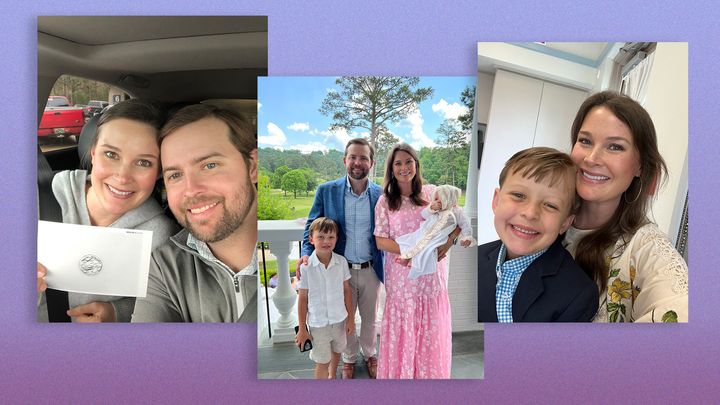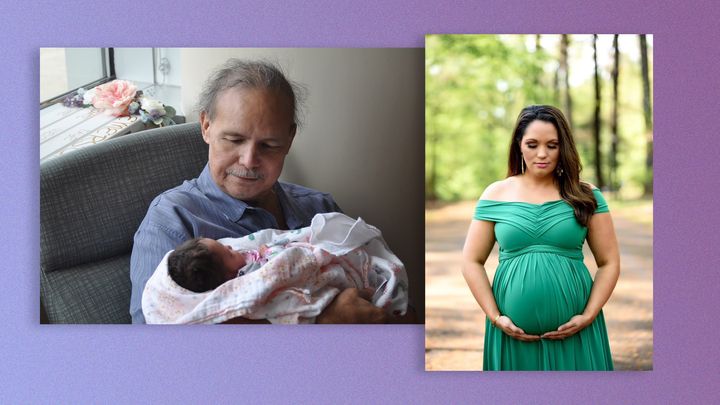Kate was scrolling through Facebook when she saw a news story about an Alabama court ruling on embryos. The 39-year-old Tennessean had been going to her fertility clinic across the border in Alabama for months, and she was exhausted. She and her husband had gone through several rounds of intrauterine insemination and in vitro fertilization, only for her first pregnancy to be nonviable.
She couldn’t bring herself to read the article. It had been months of doctor’s appointments, surgical procedures and daily hormone injections. The couple had already maxed out their credit cards and taken out loans to afford fertility treatment, which had cost them $14,000 in the last month alone.
“My initial feeling was panic,” Kate told HuffPost. Would the clinic close, she wondered? How would she pay for storage of her embryos? She started building a plan to move to a clinic in a different state, she told herself she’d quit her job if she had to.
Kate is one of the many women in Alabama deeply worried about how the ruling will impact her ability to have a child. The state is now hindering people from doing just that.
The sweeping state Supreme Court decision, released last week, grants embryos the same legal status as children — posing a direct legal threat to physicians and patients using in vitro fertilization.
IVF is a medical procedure where doctors induce ovulation and remove eggs from a patient and fertilize them with sperm outside the body. The resulting embryos can either be implanted into a patient’s uterus in the hopes of getting pregnant, or the embryos can be frozen for future use. Some embryos are usually discarded in the process – an action that now violates Alabama’s Wrongful Death of a Minor Act, a civil law dating back to 1872 that allows parents to sue over the death of a child.
IVF is already a physically, emotionally and financially draining treatment that’s deeply personal. Now, patients and providers could be left in an excruciating limbo and are struggling for answers.
Three of the largest fertility clinics in the state have paused IVF services in the wake of the ruling in order to avoid criminal prosecution. Nationwide embryo shipping services, which would have allowed patients to get care outside of Alabama, have said they are pausing embryo transport to and from Alabama.
“It is a fundamental American right to decide whether to become pregnant, when to become pregnant and to be able to decide with your physician how best it is for you to become pregnant,” Dr. Mamie McLean, a reproductive endocrinologist and fertility specialist at Alabama Fertility, a clinic in Birmingham, told HuffPost. “And if our rights can be taken away in the state of Alabama, it could happen elsewhere.”

McLean’s clinic is one of the three in the state that paused IVF services this week. She and her colleagues spent much of the day breaking the news to patients that the clinic can no longer offer the services they promised.
“The conversations with patients have been some of the most heartbreaking that I’ve had to have in my career,” McLean told HuffPost. One of the first patients she called was a woman who’d had two miscarriages in the past year. The patient and her husband had prepared for three months to do an embryo transfer this week. The procedure, in which the embryo is implanted into the uterus, requires weeks of daily hormone shots and doctors appointments in order to be successful.
And when the day came, McLean had to cancel the appointment. “She sobbed on the phone with me,” McLean said of her patient. ”She kept saying she just wants her baby.”
McLean and her colleagues at Alabama Fertility were shocked by the state court ruling and have been scrambling to come up with solutions for their patients since it was released. They’re tired, angry and, most of all, deeply concerned for the future of their fertility clinic.
“The conversations with patients have been some of the most heartbreaking that I've had to have in my career.”
- Dr. Mamie McLean, fertility specialist in Alabama
IVF is used for couples dealing with infertility, but also for LGBTQ couples, single people looking to start a family, people looking to have children later in life and people with certain health conditions. The IVF process encompasses daily doctor’s visits, hormones and other medications and even surgical procedures. Most people need to go through multiple rounds of IUI in order to qualify for IVF. And many have tried and failed to get pregnant for months or years before turning to fertility treatments.
“It’s the money that goes into it that you’ve now lost. It’s the time which is invaluable to an IVF patient. It’s the physical, emotional and mental toll of the shots and the hormones,” said Rebecca Matthews, an IVF patient of McLean’s at Alabama Fertility.
Matthews and her husband were given a false sense of hope when she got pregnant and gave birth to their son, Jack, after their first round of IVF in 2016. Three years later, they attempted to transfer the rest of their embryos to try for a second child. She miscarried over 10 times and went through most of their remaining embryos. They finally turned to surrogacy to have their daughter, who was named McLean — after her doctor, Mamie McLean.

Matthews currently has one remaining embryo stored at Alabama Fertility and she’s worried its fate is not in her hands. “I have felt like we’ve been backed into a corner and our options are fewer and fewer, and they may have legal consequences that come with them,” she said.
The state Supreme Court decision centered on a 2020 lawsuit in which three couples sued another Alabama fertility clinic and hospital for the “wrongful death” of their frozen embryos, using a legal framework for bringing civil charges when a child dies. The couples’ frozen embryos were reportedly destroyed by a patient who wandered into the cryogenic storage area where the embryos are kept and dropped them on the floor.
A circuit court judge had dismissed the lawsuit in the wrongful death suit, ruling that the statute did not apply to frozen embryos, but the Alabama Supreme Court reversed that decision. A majority of the justices — including the chief justice, who recently appeared on a QAnon conspiracist’s show — ruled in favor of defining embryos as children under the wrongful death statute.
“Nobody cares more about embryos than fertility patients. But also, nobody understands better than a fertility patient that an embryo is not a child,” Brittany Stuart, who was an IVF patient in Alabama in 2018, told HuffPost.
Stuart, who now lives in Virginia, said she and her husband turned to IVF when her dad was diagnosed with terminal colon cancer. She wanted to give her father a grandkid and he didn’t have much time. Stuart’s daughter is now five years old, and she was able to meet her grandfather before he passed. But Stuart is worried about her remaining embryo, which is being stored in an Alabama clinic.
“I just wonder what’s next,” she said. “If embryos are life, what else are they going to regulate? Where do we go from here? That’s the part that really scares me.”

Abortion rights advocates have warned that this is the next step in the war on reproductive rights. Some anti-abortion activists oppose IVF because they believe a fertilized egg is a person, and they consider discarding fertilized eggs to be murder, but those beliefs are fringe even within the pro-life movement. Other far-right conservative groups have gone after IVF because the fertility treatment helps many LGBTQ people start families.
Both Democrats and Republicans in the Alabama state legislature are working quickly to introduce legislation to create protections for IVF. House Democrats filed a bill earlier this week that would declare any egg or embryo existing outside of a uterus “not considered an unborn child or human being.” And Republican state Sen. Tim Melson, chair of the Senate Healthcare Committee, told the Alabama Reflector that he plans to file a bill to carve out protections for IVF.
Even staunchly anti-abortion conservatives in the state are working to protect Alabaman parents from the state Supreme Court’s decision. Alabama Attorney General Steve Marshall — who pledged to prosecute people for taking abortion pills or assisting with out-of-state abortion travel — said he won’t go after IVF families or providers.
“I just wonder what's next. If embryos are life, what else are they going to regulate? Where do we go from here?”
- Brittany Stuart, IVF patient
“I’m hearing from people from on both sides of the aisle and everyone’s enraged,” said Matthews, the IVF patient who named her daughter after McLean. “I’m really hoping that the Alabama Supreme Court is feeling like they are on an island alone right now.”
Congressional Democrats have been warning since Roe fell that the next wave of anti-choice action could take aim at fertility treatments like IVF. Sen. Tammy Duckworth (D-Ill.) and Rep. Susan Wild (D-Pa.) last month introduced the Access to Family Building Act, which seeks to create a federal right to access IVF and other fertility treatments.
The national Republican machine has also come out strongly against the ruling, with former President Donald Trump calling on the state legislature “to act quickly to find an immediate solution to preserve the ability of IVF in Alabama.” The campaign arm for Senate Republicans sent a memo to candidates this week urging them to “clearly and concisely reject efforts by the government to restrict IVF.” Republican presidential hopeful Nikki Haley has been one of the few to even partially defend the controversial ruling, telling NBC News she believes embryos are babies (though she later backtracked).
Kate, who’s still emotionally recovering from the disappointment of a nonviable pregnancy, is grateful her fertility clinic has not paused IVF services yet, but she’s frustrated. As a social worker who works with people with developmental disabilities, she wishes the state would direct its attention to more pressing issues, like support for disabled Alabamans who have already been born.
“We need to focus there, not on something before life even begins. We have a lot of other places that we need to work on, especially in this state.”

